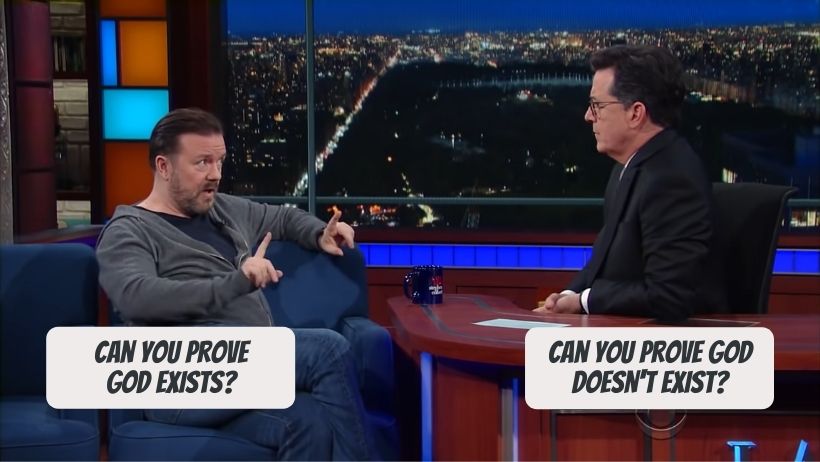Has anyone ever offered to “pray for you” because they sincerely believed you were going to hell for being Jewish and not following their beliefs? It happened to me in Texas. Or maybe someone of another faith has come knocking on your door trying to spread the “good word”? It’s frustrating enough when someone insists that their way is the right way, but even more so when it’s about religion. I love Judaism (I’m a rabbi, after all), but that doesn’t mean I think Judaism is for everyone or that it’s the only right answer.

In 2017, Rick Gervais, famously an atheist, had a fascinating and friendly debate with devout Catholic Stephen Colbert on The Late Show. As a point to challenge Colbert’s belief in God, Gervais retorts, “So you believe in one God, I assume? Okay, but there are about 3,000 to choose from. Basically, you deny one less God than I do. You don’t believe in 2,999 gods. And I don’t believe in one more.”
In other words, who’s to say that they are absolutely right when it comes to religious belief? As a rule, Jews don’t proselytize. We don’t seek to convert others to Judaism. Like me, this is one of those Jewish facts you’ve probably known your whole life. This is why it puzzled me when, as a teenager, I saw representatives from the local Chabad standing on the sidewalk outside my public high school on Friday afternoons trying to teach the boys how to put on tefillin. I also clearly remember going up to them one week when I was feeling very brave, having my own tefillin with me, and showing them that I could do it too.
What was Chabad doing outside my public high school? They would argue that they weren’t proselytizing because, of course, they wouldn’t ask people of other faiths to put on tefillin; instead, they were trying to help other Jews fulfill the obligation. If that’s true, though, why stand outside the public high school? Why not stand outside a synagogue before daily minyan?
Perhaps the answer is found in this week’s Torah portion. We read from Parshat Chayei Sarah, which makes the transition from one generation to the next. Beginning with Sarah’s death, we learn about Isaac and his courtship with Rebekah, the list of Abraham’s descendants, and the death of Abraham and his burial at the cave of Machpelah. Through it all, the family continues to push their way from experiences of loss and grief into the next chapter of life.
As Abraham is trying to find land for burial and also a wife for Isaac, we read in chapter 24, verse 2: “Put your hand under my thigh and I will make you swear by the Lord, the God of heaven and the God of earth . . .” By using the phrase “the God of heaven and the God of earth,” our midrash suggests that Abraham was bringing awareness to the fact that God does not only rule in heaven, but also on earth. Throughout this passage he refers back to the fact that God rules both in heaven and on earth.
So what does this have to do with proselytizing or not proselytizing? Midrash teaches that Abraham was the first individual to recognize this and to try and teach it to others. However, Abraham didn’t go out looking for others to join him on his journey of following God. He didn’t go out and preach to everyone of God’s truth. Rather, he shared this special connection, this special teaching, with those in his circle whom he knew needed to hear it. He looked for others who might already share this belief and tried to bring them all together. For example, when he looked for a wife for Isaac, he wanted someone who already shared this belief in God to make their community that much stronger.
I don’t think either Ricky Gervais or Stephen Colbert were actually expecting the other person to completely change their viewpoint. Similarly, Chabad’s presence outside my high school wasn’t about converting anyone to something that they didn’t previously believe. While that public act might make some people uncomfortable, that public act also reminded the Jews who were there what it means to be Jewish and what it means to have community. Likewise, Abraham also wasn’t out to change people’s minds; he was hoping to bring people closer together in love and faith. May we work to live in a world where we’re not trying to change people’s beliefs to match our own, but instead, strengthening our own circles so that we all, in turn, strengthen each other.



